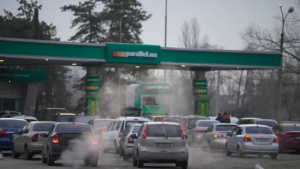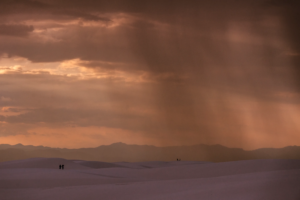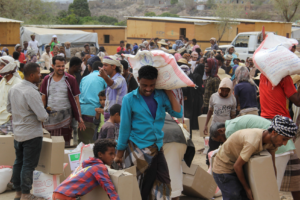Retired paratroop commander Adrian Freer recalls spending a “weird” 24 hours with Russian forces who made a lightning dash for Pristina airfield in June 1999 at the end of the Kosovo war, and the “disaster” that was averted.
This post is also available in this language: Shqip
Up until June 11, 1999, the plan was for the paratroopers of Brigadier Adrian Freer’s 5th Airborne Brigade to land at the airfield outside Pristina, but NATO commanders had a change of heart and sent them to secure the southern entrance into Kosovo instead, at the narrow Kacanik Pass.
Who knows what might have happened had they not been redirected; 250 Russians troops were already en route to the airfield over land from Bosnia and Herzegovina, stealing a march on 50,000 NATO-led soldiers rolling in from North Macedonia and Albania.
It was an ominous start to the NATO deployment on the back of 11 weeks of air strikes to drive out forces under then Serbian strongman Slobodan Milosevic.
As NATO deployed, Yugoslav and Serbian forces were supposed to withdraw simultaneously, but nothing was guaranteed.
“NATO troops decided that if the Yugoslav Army wished to be awkward, the Kacanik defile could block it,” Freer recalled, 25 years later, in an interview from his home in Scotland.
But they hadn’t counted on the Russians.
“It all happened very quickly. There was very little hold-up getting through the Kacanik defile, and then I was asked to get to Pristina airfield very swiftly,” Freer recalled. “The situation was extremely tense.”
The story of Russia’s lightning dash to Pristina and what subsequently ensued has become the stuff of legend ever since it emerged months later that the British general in charge of NATO forces deploying to Kosovo, Michael Jackson, refused an order from NATO’s American supreme commander, Wesley Clark, to evict the Russians.
“I’m not going to start World War Three for you,” Newsweek reported Jackson as telling Clark, raising serious concerns at the time over the chain of command in the Western military alliance.
Ahead of the 25th anniversary of the end of the Kosovo war and NATO’s deployment, 71-year-old Freer told BIRN about the “weird” 24 hours he spent with Russian general Viktor Zavarzin and Jackson’s conviction that the standoff could be resolved in a “soldier-like” way.
“The Russian contingent was small, but they were quite well-armed, and if there had been a shooting war it could have escalated very easily,” he told BIRN.
Russia and Serbia ‘hand in glove’
 British Army brigadier Adrian Freer in front of a column of army vehicles near the Kosovo town of Kacanik, 12 June 1999. Photo: EPA/POOL/REUTERS/RUSSELL BOYCE/STF/PEK/FMS.
British Army brigadier Adrian Freer in front of a column of army vehicles near the Kosovo town of Kacanik, 12 June 1999. Photo: EPA/POOL/REUTERS/RUSSELL BOYCE/STF/PEK/FMS.
According to Freer, NATO knew the Russians were on their way to the airfield. “The Russians had just driven at considerable speed,” he said.
The task of engaging with them fell to British forces, and Falklands veteran Freer.
“I got there and there was a standoff,” he said. “We started talks with the Russian general in a sort of military caravan on Pristina airfield. It was a very strained meeting. Nobody knew how that was going to work.”
It quickly became clear, he said, that there could be no talk of evicting the Russians “for sort of diplomatic reasons”.
“Seizing a piece of ground was seen as both of tactical and operational utility for Russian forces,” he said.
Zavarzin, who was the Kremlin’s military representative to NATO at the time, was “very clear in his objective”, Freer said. The general’s presence gave the Russian operation considerable weight.
“As is well known, Russia and Serbia being hand in glove, it was very much Russia coming to Serbia’s aid, if I can put it that way.”
Looking back, Freer said the British position of avoiding direct confrontation with Russian forces “was absolutely right”.
“At the end of the day, common sense prevailed. It would have just been a disaster,” he said.
As Jackson flew back to North Macedonia, Freer stayed on at the airfield.
“I ate with the Russians and I have to say their rations were particularly unattractive,” he said. “It was an interesting post-war night.”
The Russians maintained a presence at the airfield for four years before withdrawing in July 2003. Five years later, Kosovo declared independence from Serbia with the backing of the major Western powers but neither Russia nor Serbia.
Echoes in Ukraine

Moving through Kosovo immediately following the deployment, Freer recalled seeing “a huge amount of destruction”, razed villages and dead civilians.
“Not far from Pristina, in a village we saw they had murdered about 50 villagers of all ages,” he said, referring to Serbian forces.
But even as Kosovo Albanians greeted the advancing NATO convoys with flowers and smiles, Freer said the deployment was fraught with operational challenges and “planning errors” as he sought to ensure a buffer zone between advancing NATO troops and withdrawing Yugoslav and Serbian forces.
Notwithstanding sporadic incidents involving guerrillas of the Kosovo Liberation Army, KLA, Freer said NATO “ensured that the Serb forces’ withdrawal was not interfered with by the KLA”.
“The KLA recognised that there were rogue elements among them, hardliners who felt they had a point to prove. But if you’ve had your family murdered, you’re not going to be predisposed to be charitable.”
A quarter of a century on, amid a new war in Europe, Freer said he and his soldiers who deployed into Kosovo felt that they were “taking part in something purposeful, with real meaning”.

“There had clearly been some horrific ethnic cleansing and people were traumatised,” he told BIRN, and said there were parallels with Ukraine since Russia’s full-scale invasion of its neighbour in February 2022.
“There is no doubt. We were underpinning a humanitarian operation after atrocities,” Freer said. “It is clearly akin to what is happening now in Ukraine where the civilian population is very much in the front line and suffering”.
Asked whether he favoured more direct intervention by the West in the war in Ukraine, Freer said it would be “foolhardy” of him to try to second guess NATO’s future direction with regards the conflict.
“However,” he said, “there is absolutely no doubt [that] without NATO’s fulsome support, particularly its training of Ukrainian soldiers and the provision of armaments and materiel, Ukraine would be unable to sustain its current operations.”
“NATO will, I am sure, be monitoring the situation continuously in order to be in a position to appraise member governments what needs to be done to achieve a successful outcome in a number of given scenarios.”
Komandanti parashutist në pension, Adrian Freer, kujton kohën kur kaloi një 24 orësh “të çuditshëm” me forcat ruse që vërshuan në aeroportin e Prishtinës në qershor 1999 në fund të luftës në Kosovë dhe “katastrofën” që u shmang.
This post is also available in this language: English
Deri më 11 qershor 1999, plani ishte që parashutistët e Brigadës së 5-të Ajrore të komandantit Adrian Freer të zbarkonin në aeroportin jashtë Prishtinës, por komandantët e NATO-s kishin ndryshuar mendim dhe, në vend të kësaj, i dërguan ata të siguronin hyrjen jugore në Kosovë, në Grykën e ngushtë të Kaçanikut.
Kush e di se ç‘do të kishte ndodhur, nëse s’do të ishin ridrejtuar. 250 trupa ruse ishin nisur tashmë drejt aeroportit nga toka nëpërmjet Bosnjës dhe Hercegovinës, duke fituar avantazh mbi 50,000 ushtarët e udhëhequr nga NATO-ja që po vinin nga Maqedonia e Veriut dhe Shqipëria.
Ishte një fillim ogurzi për vendosjen e NATO-s pas 11 javësh sulmesh ajrore për të dëbuar forcat nën sundimin e presidentit të atëhershëm serb Sllobodan Millosheviç.
Ndërsa NATO-ja vendosej, forcat jugosllave dhe serbe duhej të tërhiqeshin njëkohësisht, por asgjë nuk ishte e garantuar.
“Trupat e NATO-s vendosën që nëse Ushtria Jugosllave dëshironte të bënte të vështirën, gryka e Kaçanikut mund ta bllokonte atë”, kujton Freer, 25 vjet më vonë, në një intervistë nga shtëpia e tij në Skoci.
Por ata nuk kishin llogaritur rusët.
“Gjithçka ndodhi shumë shpejt. Pati shumë pak vonesa në kalimin në grykën e Kaçanikut dhe më pas m’u kërkua të shkoja në aeroportin e Prishtinës shumë shpejt”, kujton Freer. “Situata ishte jashtëzakonisht e tensionuar.”
Historia e vërshimit të trupave ruse në Prishtinë dhe ajo që pasoi u bë legjendë kur, muaj më vonë, doli se gjenerali britanik përgjegjës për forcat e NATO-s të vendosura në Kosovë, Michael Jackson, refuzoi një urdhër nga komandanti suprem amerikan i NATO-s, Wesley. Clark, për të dëbuar rusët.
“Nuk do të filloj Luftën e Tretë Botërore për ju”, raportoi Newsweek t’i ketë thënë Jackson komandantit Clark, duke ngritur shqetësime serioze në atë kohë mbi zinxhirin e komandës në aleancën ushtarake perëndimore.
Përpara 25-vjetorit të përfundimit të luftës së Kosovës dhe vendosjes së NATO-s, 71-vjeçari Freer i tregoi BIRN për 24 orët “e çuditshme” që kaloi me gjeneralin rus Viktor Zavarzin dhe për bindjen e Jackson se ngërçi mund të zgjidhej në një ” mënyrë prej ushtari”.
“Kontingjenti rus ishte i vogël, por ata ishin mjaft të armatosur dhe nëse do të kishte pasur një luftë, ajo mund të ishte përshkallëzuar shumë lehtë”, tha ai për BIRN.
Rusia dhe Serbia “dorë për dore”
 Gjenerali britanik Adrian Freer para një autokolone automjetesh ushtarake pranë qytetit kosovar të Kaçanikur, 12 qershor 1999. Foto: EPA/POOL/REUTERS/RUSSELL BOYCE/STF/PEK/FMS.
Gjenerali britanik Adrian Freer para një autokolone automjetesh ushtarake pranë qytetit kosovar të Kaçanikur, 12 qershor 1999. Foto: EPA/POOL/REUTERS/RUSSELL BOYCE/STF/PEK/FMS.
Sipas Freer, NATO-ja e dinte se rusët ishin rrugës për në aeroport. “Rusët kishin përparuar me shpejtësi të konsiderueshme”, tha ai.
Detyra për t’u përballur me ta i ra forcave britanike dhe Freer, veteranit të Falklands.
“Unë arrita atje dhe pati një bllokim”, tha ai. “Filluam bisedimet me gjeneralin rus në një lloj karvani ushtarak në aeroportin e Prishtinës. Ishte një takim shumë i tensionuar. Askush nuk e dinte se si do të shkonte.”
U bë shpejt e qartë, tha ai, se nuk mund të flitej për dëbimin e rusëve “për njëfarë arsyeje diplomatike”.
“Marrja e një pjese toke shihej si dobi taktike dhe operacionale për forcat ruse”, tha ai.
Zavarzin, i cili ishte përfaqësuesi ushtarak i Kremlinit në NATO në atë kohë, ishte “shumë i qartë në objektivin e tij”, tha Freer. Prania e gjeneralit i jepte operacionit rus peshë të konsiderueshme.
“Siç dihet, Rusia dhe Serbia duke qenë dorë për dore, ishte më shumë Rusia që vinte në ndihmë Serbisë, nëse mund ta them kështu.”
Teksa kujton atë kohë, Freer tha se pozicioni britanik për shmangien e konfrontimit të drejtpërdrejtë me forcat ruse “ishte absolutisht i drejtë”.
“Në fund të ditës, mbizotëroi logjika. Do të kishte qenë thjesht një katastrofë”, tha ai.
Ndërsa Jackson u kthye në Maqedoninë e Veriut, Freer qëndroi në aeroport.
“Hëngra me rusët dhe duhet të them se racionet e tyre ishin shumë pak ftues”, tha ai. “Ishte një natë interesante e pasluftës.”
Rusët mbajtën një prani në aeroport për katër vjet përpara se të tërhiqeshin në korrik 2003. Pesë vjet më vonë, Kosova shpalli pavarësinë nga Serbia me mbështetjen e fuqive të mëdha perëndimore, por jo atë të Rusisë dhe Serbisë.
Jehona në Ukrainë

Ndërsa lëvizte nëpër Kosovë menjëherë pas vendosjes, Freer kujton se pa “një sasi të madhe shkatërrimi”, fshatra të rrafshuar dhe civilë të vdekur.
“Jo larg Prishtinës, në një fshat pamë se kishin vrarë rreth 50 fshatarë të të gjitha moshave”, tha ai, duke iu referuar forcave serbe.
Por edhe pse shqiptarët e Kosovës i përshëndetën autokolonat e NATO-s në avancim me lule dhe buzëqeshje, Freer tha se dislokimi ishte i mbushur me sfida operacionale dhe “gabime planifikimi” ndërsa ai kërkonte të garantonte një zonë tampon midis avancimit të trupave të NATO-s dhe tërheqjes së forcave jugosllave dhe serbe.
Pavarësisht incidenteve sporadike që përfshijnë luftëtarët e Ushtrisë Çlirimtare të Kosovës, UÇK, Freer tha se NATO-ja “garantoi që tërheqja e forcave serbe të mos pengohej nga UÇK-ja”.
“UÇK-ja e kuptoi se mes tyre kishte elementë mashtrues, fanatikë që mendonin se duhej të tregonin diçka. Por nëse të kanë vrarë familjen, nuk do të jesh i predispozuar të jesh dashamirës.”
Një çerek shekulli më vonë, në mes të një lufte të re në Evropë, Freer tha se ai dhe ushtarët e tij që u vendosën në Kosovë mendonin se ata “po merrnin pjesë në diçka të qëllimshme, me një qëllim të vërtetë”.

“Kishte padyshim një spastrim të tmerrshëm etnik dhe njerëzit ishin traumatizuar”, tha ai për BIRN dhe tha se kishte paralelizma me Ukrainën që nga pushtimi i plotë i Rusisë ndaj fqinjit të saj në shkurt 2022.
“Nuk ka dyshim. Ne po mbështesnim një operacion humanitar pas mizorive të kryera”, tha Freer. “Është qartazi e ngjashme me atë që po ndodh tani në Ukrainë, ku popullsia civile është në vijën e parë dhe vuan.”
I pyetur nëse ai parapëlqente më shumë një ndërhyrje më të drejtpërdrejtë nga Perëndimi në luftën në Ukrainë, Freer tha se do të ishte “e pamend” nga ana e tij të përpiqej të hamendësonte drejtimin e ardhshëm të NATO-s në lidhje me konfliktin.
“Megjithatë”, tha ai, “nuk ka absolutisht asnjë dyshim se pa mbështetjen e plotë të NATO-s, veçanërisht trajnimin e saj të ushtarëve ukrainas dhe sigurimin e armatimeve dhe materialeve, Ukraina nuk do të ishte në gjendje të mbështeste operacionet e saj aktuale.”
“NATO-ja, jam i sigurt, do të monitorojë vazhdimisht situatën në mënyrë që të jetë në gjendje të vlerësojë qeveritë anëtare mbi atë që duhet bërë për të arritur një rezultat pozitiv në një sërë skenarësh të dhënë.”




